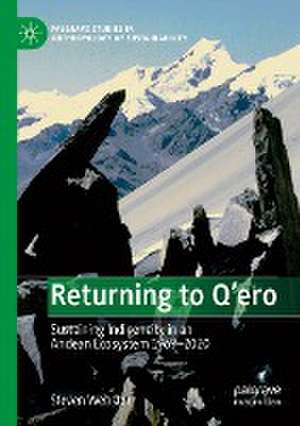Returning to Q'ero: Sustaining Indigeneity in an Andean Ecosystem 1969-2020: Palgrave Studies in Anthropology of Sustainability
Autor Steven Websteren Limba Engleză Paperback – 3 ian 2024
This book argues that while the commercial expansion of ceremonial and shamanist tourism can be seen as extractivist similar to industrial mining, the assertive form of independence characteristic of the Q'eros appears to remain sustainable in the face of both these extractive threats. While the Q'ero community is internally reinforced by their reciprocal relationship with the same non-human forces these forms of extraction seek to exploit, they are externally reinforced by the global as well as national rise of indigeneity movements. Ironically, given the moral force developed in some aspects of shamanist tourism, it can even be argued that it supports environmental sustainability against climate change, globally as well as in Q'ero. This book analyzes the increasing importance of indigeneity in the national politics of Peru as well as the other Andean nations in the last few decades, but it remains to set this form of identity politics in its wider “intersectional” context of social class and ethnic conflict in the Andes.
| Toate formatele și edițiile | Preț | Express |
|---|---|---|
| Paperback (1) | 892.90 lei 6-8 săpt. | |
| Springer International Publishing – 3 ian 2024 | 892.90 lei 6-8 săpt. | |
| Hardback (1) | 898.13 lei 6-8 săpt. | |
| Springer International Publishing – 2 ian 2023 | 898.13 lei 6-8 săpt. |
Preț: 892.90 lei
Preț vechi: 1088.90 lei
-18% Nou
Puncte Express: 1339
Preț estimativ în valută:
170.86€ • 182.70$ • 142.46£
170.86€ • 182.70$ • 142.46£
Carte tipărită la comandă
Livrare economică 17 aprilie-01 mai
Preluare comenzi: 021 569.72.76
Specificații
ISBN-13: 9783031049743
ISBN-10: 3031049748
Ilustrații: XXXVIII, 379 p. 24 illus.
Dimensiuni: 148 x 210 mm
Greutate: 0.5 kg
Ediția:1st ed. 2023
Editura: Springer International Publishing
Colecția Palgrave Macmillan
Seria Palgrave Studies in Anthropology of Sustainability
Locul publicării:Cham, Switzerland
ISBN-10: 3031049748
Ilustrații: XXXVIII, 379 p. 24 illus.
Dimensiuni: 148 x 210 mm
Greutate: 0.5 kg
Ediția:1st ed. 2023
Editura: Springer International Publishing
Colecția Palgrave Macmillan
Seria Palgrave Studies in Anthropology of Sustainability
Locul publicării:Cham, Switzerland
Cuprins
Prologue: a Retrospective Ethnohistory.-Part I: Q'ero and the Peruvian Andes 1969 - 1977.-Introduction: Participant Observation among the Q'eros [field-notes, 1972 preface, and 1977 journal].- Chapter 1: Earlier Empires [colonisations, nation, and hacienda dominion;1972 ms Chs 1-3 annotated with 1971, 1973, and 1981 articles (pseudonym dropped)].- Chapter 2: Runa, Cholo, Misti, and Wiracocha: Indigeneity and Ethnicity in the Andean Highlands [1972 ms Chs 1-3 annotated with 1971, 1973, 1980, and 1981 articles (pseudonym dropped)].- Part II: Ecological and Social Integration of a Transhumant Community in the Andean Highlands.- Chapter 3: Verticality and Transhumance [1972 ms Chs 4 and 5 with field-notes, annotated with 1971, 1973, and 1974 articles (pseudonym dropped)].- Chapter 4: Subsistence Cycles, Strategies, and Rituals of Reciprocity [1972 ms Chs 6 and 7 with field-notes, annotated with 1971 and 1973 articles].- Chapter 5: Domestic Groups, Kinship and Affinity, and Social Rank [1972 ms Chs 7 and 8 with field-notes, annotated with 1977 and 1974 articles (pseudonym dropped)].- Part III: Sustainability, Extractivity, and Q'ero since the 1970s.-Chapter 6: Indigeneity, Tourism, and Extractivism in the Cuzco Region [Chs 1- 5 above, in view of Salas de Carreño, de la Cadena, Gose, and Meyer (see attached bibliography)].- Chapter 7: Shamanism, Reciprocity, and Extractivism in Q'ero [Chs 1-5 above, in view of de Cometti, Wissler, and Salas de Carreño (see attached bibliography)].- Chapter 8: Sustaining Indigeneity against Commodity Fetishism [Chs 1-5 above, in view of Taussig, Gose, Graeber, and Webster (see attached bibliography)].- Conclusions.
Notă biografică
Steven Webster taught Social Anthropology and Maori Studies at the University of Auckland, New Zealand 1972 - 1998, and after retiring continued as an Honorary Research Fellow at his alma mater the University of Washington, Seattle, as well as at Auckland, and as a visitor at the Northwest Indian College and Princeton University.
Textul de pe ultima copertă
Caracteristici
Provides a history of sustainability among the indigenous Andean community of the Q’ero since the 1960s Focuses on the relationship between ecological sustainability and mining extractivism Analyzes the increasing importance of indigeneity in the national politics of Peru in the last few decades







